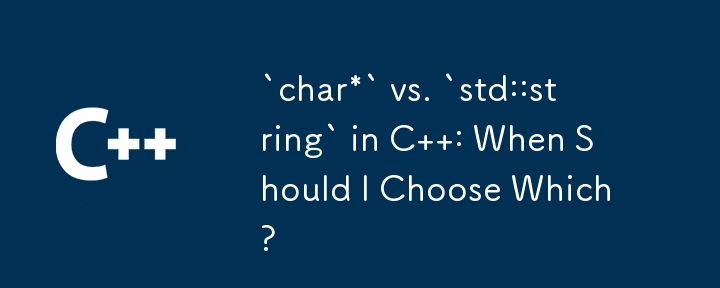`char*` vs. `std::string` in C : When Should I Choose Which?
Nov 26, 2024 am 05:07 AM
char* and std::string in C : A Comparative Analysis
In C , char pointers and std::strings provide two distinct mechanisms for managing character arrays. While both have their strengths, the choice between them often involves a trade-off between performance and ease of use.
Suitability of char* and std::string
- Performance: char* offers greater control over memory management and can be slightly faster than std::string, especially for small arrays.
- Ease of use: std::string simplifies memory management, provides built-in methods for string manipulation, and allows for pass-by-reference to avoid unnecessary copying.
Additional Considerations
Beyond the primary performance and ease-of-use trade-off, there are a few additional factors to consider:
- Passing large strings by reference: std::strings can be passed by reference to avoid copying large data structures. Alternatively, a pointer to the instance can be used.
- Non-textual data: char* is suitable for storing non-textual data, where std::string's string handling capabilities may not be necessary.
- Memory management: char pointers require manual memory management and are prone to memory leaks if not handled properly. std::strings automatically manage memory and provide safeguards against these issues.
Conclusion
Ultimately, the choice between char and std::string depends on the specific requirements of an application. char offers slightly better performance and greater control over memory management, while std::string provides enhanced ease of use, automatic memory management, and built-in string manipulation capabilities. Developers should carefully weigh the trade-offs before making a decision.
The above is the detailed content of `char*` vs. `std::string` in C : When Should I Choose Which?. For more information, please follow other related articles on the PHP Chinese website!

Hot Article

Hot tools Tags

Hot Article

Hot Article Tags

Notepad++7.3.1
Easy-to-use and free code editor

SublimeText3 Chinese version
Chinese version, very easy to use

Zend Studio 13.0.1
Powerful PHP integrated development environment

Dreamweaver CS6
Visual web development tools

SublimeText3 Mac version
God-level code editing software (SublimeText3)

Hot Topics
 What are the types of values returned by c language functions? What determines the return value?
Mar 03, 2025 pm 05:52 PM
What are the types of values returned by c language functions? What determines the return value?
Mar 03, 2025 pm 05:52 PM
What are the types of values returned by c language functions? What determines the return value?
 C language function format letter case conversion steps
Mar 03, 2025 pm 05:53 PM
C language function format letter case conversion steps
Mar 03, 2025 pm 05:53 PM
C language function format letter case conversion steps
 What are the definitions and calling rules of c language functions and what are the
Mar 03, 2025 pm 05:53 PM
What are the definitions and calling rules of c language functions and what are the
Mar 03, 2025 pm 05:53 PM
What are the definitions and calling rules of c language functions and what are the
 Where is the return value of the c language function stored in memory?
Mar 03, 2025 pm 05:51 PM
Where is the return value of the c language function stored in memory?
Mar 03, 2025 pm 05:51 PM
Where is the return value of the c language function stored in memory?
 How do I use algorithms from the STL (sort, find, transform, etc.) efficiently?
Mar 12, 2025 pm 04:52 PM
How do I use algorithms from the STL (sort, find, transform, etc.) efficiently?
Mar 12, 2025 pm 04:52 PM
How do I use algorithms from the STL (sort, find, transform, etc.) efficiently?
 How does the C Standard Template Library (STL) work?
Mar 12, 2025 pm 04:50 PM
How does the C Standard Template Library (STL) work?
Mar 12, 2025 pm 04:50 PM
How does the C Standard Template Library (STL) work?









